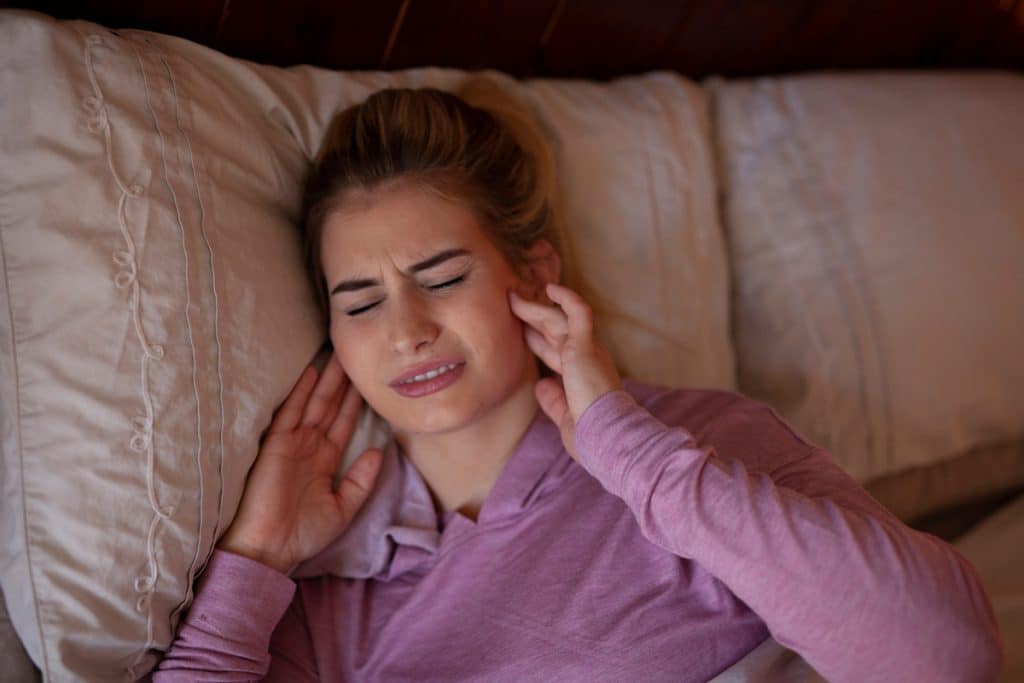Do I Have TMJ? Common Signs & Symptoms

TMJ syndrome is a painful condition characterized by jaw and facial pain, among other disruptive symptoms. Many patients with active TMJ report that they have difficulty eating, speaking, and relaxing.
TMJ is a complex problem that may easily be confused with other medical issues. A medical diagnosis from your dentist or physician is necessary to relieve symptoms.
About TMJ Syndrome
TMJ is a common acronym for the temporomandibular joint. These joints connect the mandible (lower jaw) to the skull. They are complex sliding hinges that allow a wide range of jaw movements. When these joints become inflamed, they can have far-reaching ripple effects on the body.
Common Symptoms of TMJ
You may experience one or more of these symptoms:
- Jaw pain that may be most bothersome in the morning or late in the day
- Pain in the facial muscles
- Pain that spreads to other areas, including the eyes, back, neck, or shoulder
- Headaches
- Ringing in the ears or earache not caused by an ear infection
- Jaw clicking, grating, and popping, accompanied by pain
- Difficulty opening and closing the mouth
- Teeth clenching or grinding
- Feelings of dizziness
- Altered dental bite
- Depression or eating disorders
Causes of TMJ Syndrome
TMJ does not always have clear causes. The disorder may appear without these typical triggers.
Jaw Injury
Any accident or blow to the face could trigger symptoms of TMJ. Car accidents, sports accidents, and falls could be to blame.
Arthritis
Like any joint, the TMJ may develop arthritis. Arthritis affects the cartilage, bone, and other tissues, causing joint abrasion and deterioration.
Disc Problems
The disc inside the joint may slip out of position or deteriorate.
Stress
Researchers are beginning to understand the deep connection between TMJ symptoms and stress. Stress causes muscle tension and may lead to habits like jaw clenching and teeth grinding. The TMJ may experience overuse, leading to the disorder.
Bruxism and TMJ
Bruxism is one of the most prevalent causes of TMJ disorder. Bruxism is habitual teeth clenching and grinding. This problem causes excess tension in the jaw muscles and joints.
Treatment Methods
Fortunately, your dentist has many effective TMJ treatment options. Most treatment options are supportive and non-invasive, with surgery reserved for extreme cases.
Oral Appliance Therapy
Oral appliances hold the jaw in a neutral position, allowing the muscles around the joints to relax and relieve pain.
Warm and Cold Compresses
Dentists recommend alternating warm and cold therapy on the jaw and facial muscles, depending on what feels better.
Gentle Stretches
Your dentist can teach you specific stretches to perform to help strengthen and relax your muscles.
Dietary Considerations
When you experience a TMJ flare-up, avoid hard, crunchy, and chewy foods. A softer diet will reduce joint stress.
Stress Reduction
In today's fast-paced world, stress reduction may be difficult to achieve. However, many TMJ patients find relief when they adopt new habits like meditation and yoga.
Over-the-Counter Pain Medication
OTC medications can help to alleviate pain.
Combating TMJ Syndrome
If you experience any of the symptoms listed above, be sure to get in touch with us as soon as possible. You don't have to live with the pain, tension, and sleepless nights caused by TMJ. Your dentist will try treatment options until they find something that works for you, and if your condition is severe, you may be a candidate for surgery.
Frequently Asked Questions About TMJ
Can TMJ go away on its own?
Many patients find that their TMJ symptoms eventually resolve on their own. They may recur at different times, especially if the patient feels stressed. If you have complex symptoms, the condition is unlikely to go away without dental or medical intervention.
My jaw pops and clicks sometimes, but it doesn't hurt. Should I see a dentist for TMJ?
If your jaw makes noise when you chew or open and close your mouth but does not hurt, you are unlikely to have TMJ. However, if the noises go along with pain, you could have the disorder. A dentist can help you determine which jaw symptoms are harmless and which are signs of a potentially severe problem.
Call Davis Gribble Hollowwa Dental
We want to help you overcome your TMJ symptoms. Please call our Albuquerque, NM, office today at 505-898-1976 to schedule a consultation with one of our expert doctors.

